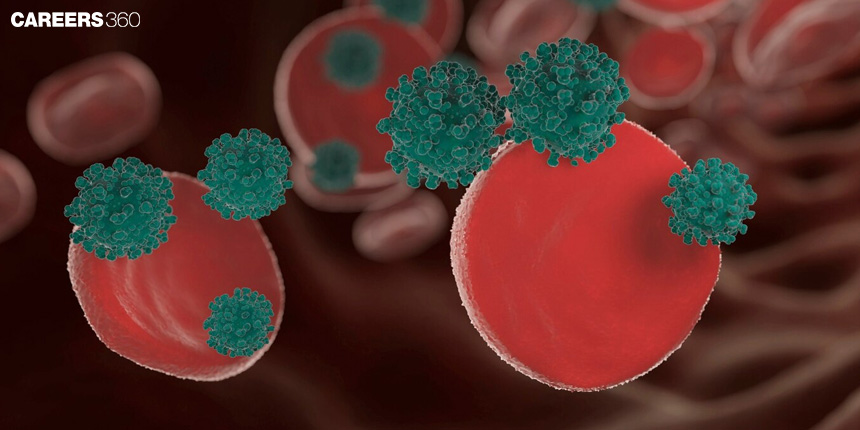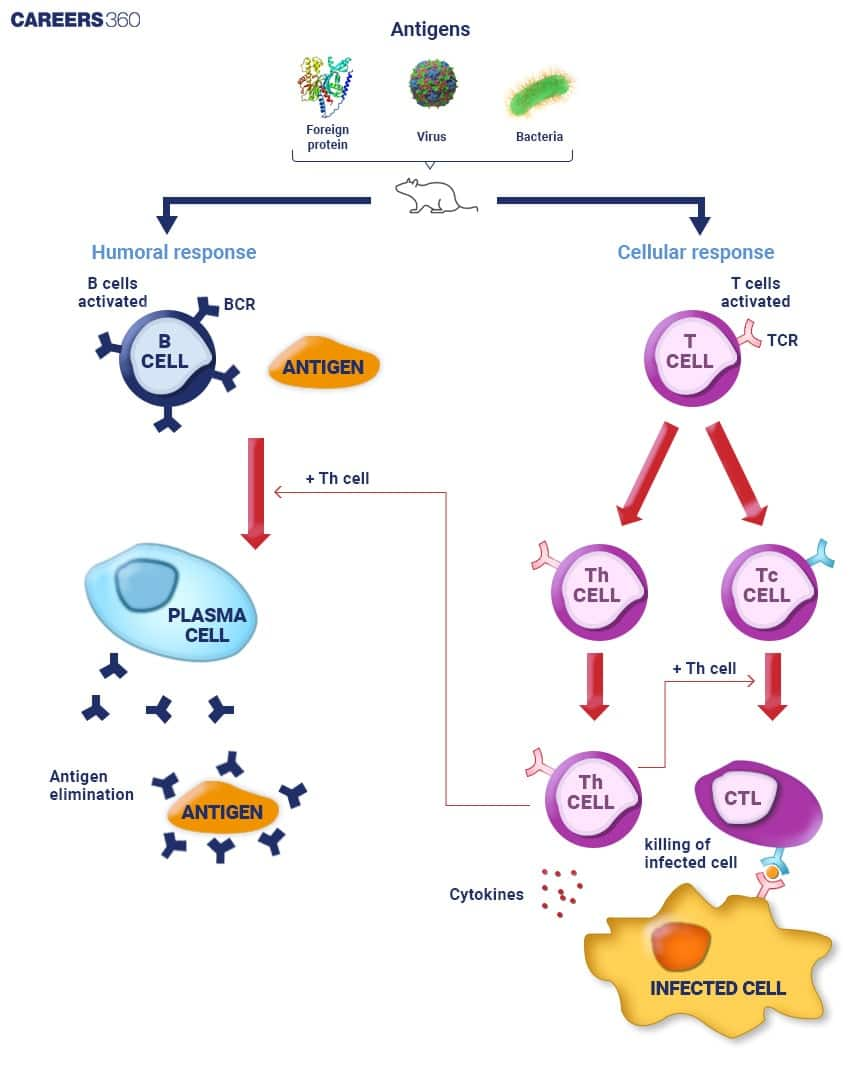Difference Between Humoral And Cell Mediated Immunity
The difference between humoral and cell-mediated immunity is that it has its defence mechanism of defending the body against pathogens. Humoral immunity is also known as antibody-mediated immunity where the production of antibodies takes place through B cells. Cell-mediated immunity depends upon T cells where they directly attack and destroy the abnormal and infected cells. Both of them are an important part of the chapter Human Health and Disease class 12th Biology.
Don't Miss: Most scoring concepts for NEET | NEET papers with solutions
NEET 2025: Syllabus | PYQs | Crack NEET in 2 months - Study Plan
NEET Important PYQ & Solutions: Physics | Chemistry | Biology | NEET PYQ's (2015-24)
- Differences Between Humoral And Cell-Mediated Immunity
- Humoral Immunity vs Cell-Mediated Immunity
- What is Humoral Immunity?
- What is Cell-Mediated Immunity?
- Tips, Tricks, and Strategies for Humoral and Cell-mediated Immunity

Differences Between Humoral And Cell-Mediated Immunity
The immune system is the body’s protection against infections and diseases. Immunologically, it is a cellular, tissue, and organ system capable of recognising and eliminating pathogens. Awareness of the immune system is essential, as it plays an important role in achieving and maintaining health. Thus, the two subdivisions of adaptive immunity include
humoral immunity and
cell-mediated immunity,
Their functions characterize these two.
Also read:
Humoral Immunity vs Cell-Mediated Immunity
Comprehensive Comparison of Humoral and Cell-Mediated Immunity
Feature | Humoral Immunity | Cell-Mediated Immunity |
Definition | Immunity attributed to antibodies in body fluids | Immunity attributed by T cells |
Main Components | B cells, plasma cells, antibodies | T cells (helper, cytotoxic, regulatory) |
Target Pathogens | Extracellular pathogens (bacteria, viruses) | Intracellular pathogens (virus-infected cells) |
Mode of Action | Neutralisation, opsonization, complement activation | Direct killing of infected cells |
Memory Cells | Memory B cells | Memory T cells |
Response Time | Faster response to pathogens | Slower response requires antigen presentation |
Duration of Response | Short to long-term, depending on memory cells | Long-term due to memory T cells |
Specificity | Specific to antigens but can bind to similar ones | Highly specific to presented antigens |
Examples of Responses | Response to bacterial infections, neutralisation of toxins | Response to viral infections, tumour cell destruction |
Primary Function | Protect against extracellular pathogens and toxins | Eliminate intracellular pathogens and abnormal cells |
Associated Disorders | Autoimmune diseases like lupus | Autoimmune diseases like multiple sclerosis |
Evolutionary Aspect | Present in all vertebrates | More specialised and complex, evolved in vertebrates |
What is Humoral Immunity?
Humoral Immunity Definition and Mechanism: Humoral Immunity is a kind of immunity produced by accessory cells known as antibodies that are released into the body fluids by B cells. It has the function of protecting the body against foreign microorganisms and removing toxins.
In this process, B cells are activated by the presence of antigens and, as a result, differentiate into plasma B cells and remember B cells. The antibodies specific to the antigens are produced by the plasma cells, while the memory B cells give a person immunity to the antigen in the long run.
Process of Humoral Response
B cells are efficient when an antigen invades the body because they identify it before attaching to it. They later turn into plasma cells that produce antibodies and memory B cells that ensure that response is hastened in the presence of a previous antigen.
Function of Antibodies
They inactivate the pathogens by binding to them, opsonize them, and call for the aid of the complement system to more easily dispose of the pathogens.
What is Cell-Mediated Immunity?
Cell-mediated immunity emphasises the T cells, which directly attack the cells that are infected or abnormal. It is useful for killing intracellular pathogens and cancer cells, the possible removal of which may cause problems for circulation.
Specific T cells distinguish between the body’s cells and infected ones, which are marked by foreign antigens on their surface, and kill them. Helper T cells are the common forms of T cells and help in the functioning of the other T cells, cytotoxic T cells that kill infected cells, regulatory T cells that suppress the immune response, and T memory cells that prolong the response to infection.
Types of T Cells
Different Types of Cell-mediated T- cells are described below:
Helper T cells (CD4+): They also help other immune cells that are involved in the immune response by producing what is known as cytokines.
Cytotoxic T cells (CD8+): To directly kill the infected or cancerous cells selectively the ability to identify the pathogenic organism or cancerous cell is required.
Regulatory T cells: Search for ways to ensure that the immune system does not attack the body’s tissues.
Memory T cells: Acquire long-term immunity by doing the following, The immune system must be able to remember past infections to provide long-term immunity.
Process of Cell-Mediated Response
T cells are activated by the process of presentation of the antigen. Cytotoxic T cells go on to eliminate the infected cells and on the other hand, helper T cells secrete cytokines facilitating the immune response.
Humoral Immune Response vs Cell-Mediated Immune Response

Similarities between Cell-mediated and Humoral Immunity
Major Similarities between Cell-Mediated and Humoral Immunity are discussed below in the table.
Aspect | Cell-mediated Immunity | Humoral Immunity |
Involvement of Lymphocytes | Both involve lymphocytes (T cells in cell-mediated, B cells in humoral) | Both involve lymphocytes (B cells in humoral, T cells assist in activation) |
Adaptive Immune Response | Both are part of the adaptive immune response | Both are part of the adaptive immune response |
Antigen Specificity | Both are specific to particular antigens | Both are specific to particular antigens |
Memory Cells Formation | Both generate memory cells for long-term immunity | Both generate memory cells for long-term immunity |
Activation Requirement | Both require activation by antigens | Both require activation by antigens |
Role in Immunity | Both are essential for effective immunity against pathogens | Both are essential for effective immunity against pathogens |
Involvement of Helper T Cells | Helper T cells assist in activating cytotoxic T cells | Helper T cells assist in activating B cells |
Interdependence | Cell-mediated immunity can influence humoral responses | Humoral immunity can influence cell-mediated responses |
Tips, Tricks, and Strategies for Humoral and Cell-mediated Immunity
It takes effort to remember everything in a single go. We made the entire problem easy. Some of the tricks regarding Humoral and cell-mediated are given below which you can use to memorise the important points.
Humoral Immunity
"BAAP: B cells, Antibodies, Attack pathogens, Plasma cells"
B: B cells produce antibodies.
A: Antibodies bind to pathogens to neutralize them.
A: Attack extracellular pathogens (like bacteria and toxins).
P: Plasma cells are activated B cells that secrete antibodies.
Cell-Mediated Immunity
"T-DAK: T cells, Direct Attack, Kill infected cells"
T: T cells are the main players.
D: Direct action against infected or abnormal cells.
A: Attack intracellular pathogens (like viruses) inside cells.
K: Kill infected or abnormal cells directly.
Differences Between Humoral and Cell-Mediated Immunity
"BALL vs. DIRECT: B cells & Antibodies, Long-range vs. T cells, Direct Attack"
B cells produce Antibodies that provide
Long-range defence against pathogens.
T cells perform Direct Attack by killing infected cells.
T cells perform Direct Attack by killing infected cells.
Also Read
Frequently Asked Questions (FAQs)
In general, it can be indicated that the principal difference between humoral and cell-mediated immunity is based on the differences in their operations and objectives. Humoral immunity is the immunity that is offered by the antibodies that come from B cells and target pathogens that are outside the cells, such as bacteria and viruses. Cellular immunity, on the other hand, employs T cells, which are white blood cells that have a special function of identifying infected or diseased cells and then destroying them. Intracellular pathogens such as viruses are defeated by this form of immunity.
B cells are mainly associated with the immune response, which relies on the production of antibodies. B cells, when triggered by certain antigens, transform into plasma cells that secrete antibodies and memory B cells that confer immunological memory.
Cytotoxic T cells kill infected cells by binding to that cell via antigens that are present on the surface of the infected cell. They then neighbour and discharge perforins and granzymes into the infected cell, which forms pores in the cell membrane and kills the infected cell through apoptosis.
There are several functions that antibodies perform in humoral immunity. They inactivate pathogens since they form a complex with them, and they cannot go on and infect the cells. They also label the pathogens to be destroyed by the process called opsonization and stimulate the complement system, which increases the ability to eliminate pathogens from the body.
Yes, it is possible that both forms of immunity, such as humoral immunity and cell-mediated immunity, can be alike in an individual pathogen. For instance, during a viral disease, antibodies are capable of blocking the virus from spreading in the body fluids, while cytotoxic T cells can identify those cells that have been infected and kill them. Such a coordinated response helps to cover the whole territory of the organism against the pathogen.
Also Read
13 Nov'24 07:17 PM
13 Nov'24 05:08 PM
12 Nov'24 03:37 PM
12 Nov'24 01:07 PM
11 Nov'24 06:10 PM
10 Nov'24 07:48 PM
08 Nov'24 04:15 PM
06 Nov'24 08:32 AM
05 Nov'24 02:16 PM